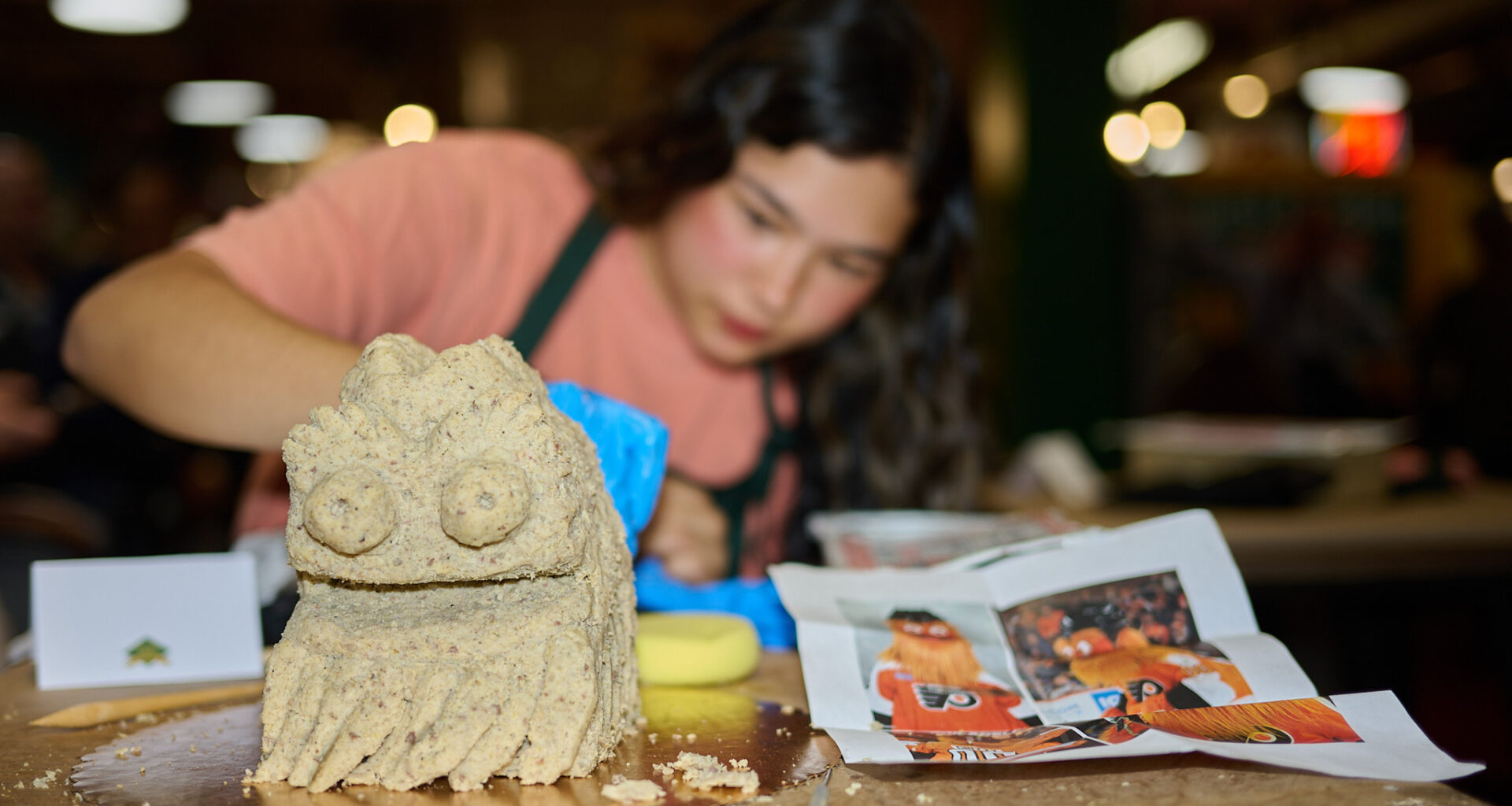Philadelphia’s taste for gritty culinary traditions and unlikely artistic mediums was on display at Reading Terminal Market’s second annual Scrapple Sculpting Contest. The event invited artists and enthusiasts to transform five-pound blocks of scrapple into creative sculptures, celebrating both the delicacy and the city itself.
This uniquely Pennsylvania Dutch breakfast meat has been a local favorite for well over a century, with the first recipes appearing in the Philadelphia region. Traditionally made from leftover pork, cornmeal, and a blend of spices, scrapple was a way to avoid waste by turning less-favored pork parts into a hearty meal.
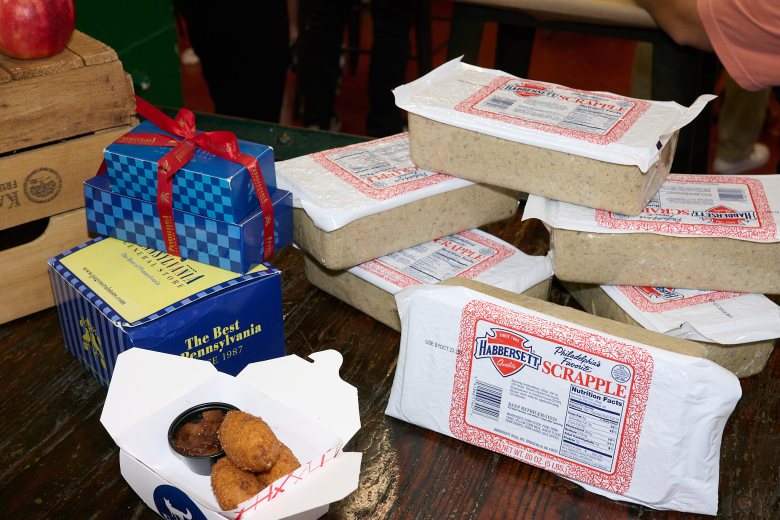 Only in Philadelphia would a five-pound block of pork scraps become a blank canvas at the Scrapple Sculpting Contest. (Hanbit Kwon for Billy Penn)
Only in Philadelphia would a five-pound block of pork scraps become a blank canvas at the Scrapple Sculpting Contest. (Hanbit Kwon for Billy Penn)
Cooking scrapple at home sounds simple: slice and griddle, aiming for a golden crispy exterior with a hot creamy interior, but it’s easy to end up with a soggy, sad platter rather than a sumptuous breakfast staple.
The Scrapple Sculpting Contest put the controversial versatility of Philly’s savory staple in the spotlight — slicing open stereotypes by revealing the artistry within this iconic yet often misunderstood Philly classic.
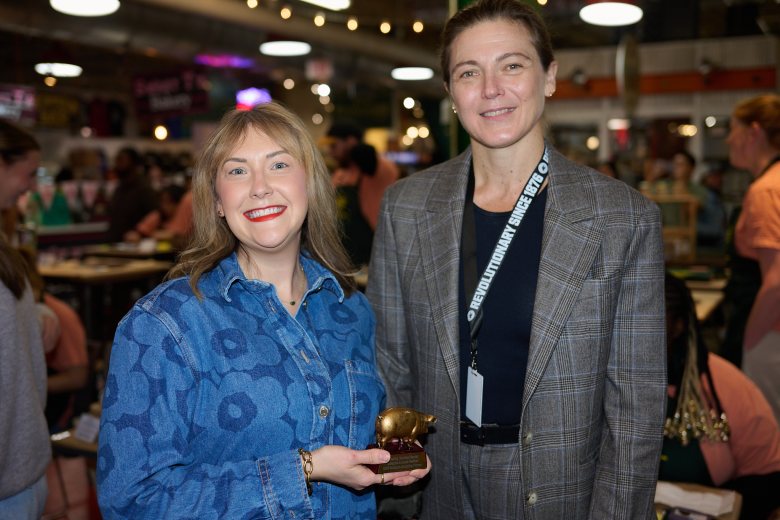 Author and emcee Amy Strauss (left) and Sasha Suda with “Scrappy” the trophy (Hanbit Kwon for Billy Penn)
Author and emcee Amy Strauss (left) and Sasha Suda with “Scrappy” the trophy (Hanbit Kwon for Billy Penn)
The contest was emceed by Amy Strauss, author of “Pennsylvania Scrapple: A Delectable History,” whose Pennsylvania Dutch heritage helped shape her passion for the culinary creation.
Strauss views scrapple as both humble and rural, yet also deeply tied to regional pride: “Scrapple is the true metaphor for Philadelphia. It’s a little mysterious. It’s a little down home and a little gritty. But it always brings so much delight and so much joy to so many folks.”
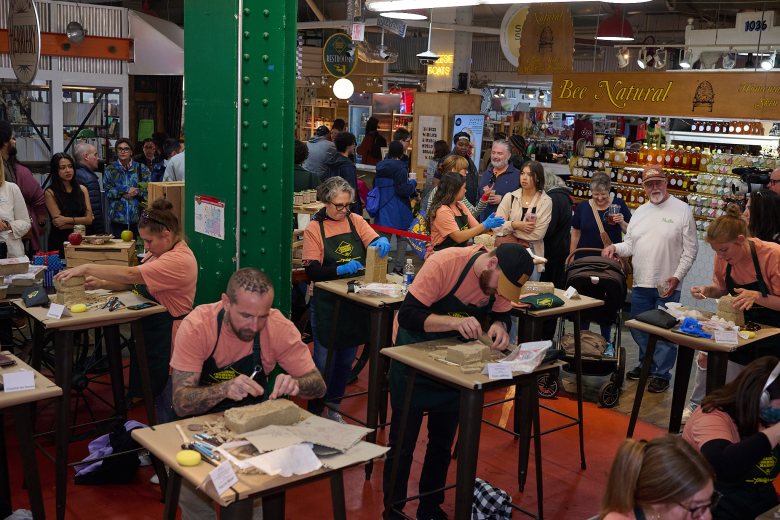 Contestants working on their edible masterpieces at the 2025 Scrapple Sculpting Contest at Reading Terminal Market. (Hanbit Kwon for Billy Penn)
Contestants working on their edible masterpieces at the 2025 Scrapple Sculpting Contest at Reading Terminal Market. (Hanbit Kwon for Billy Penn)
Strauss traces scrapple’s origin to the frugal German settlers of Pennsylvania, linking it to traditions of “nose-to-tail” resourcefulness that made use of scraps and to its modern revival in reimagining the iconic staple.
Sasha Suda, director of the recently rebranded Philadelphia Art Museum, served as a judge for the competition on Friday.
Speaking about her role as judge, Suda commented: “I came here with no predisposed notions of who’s going to win or what it’ll take to win. That’s the beauty of art. You don’t know what to expect.”
“I always look for the originality of the piece,” she continued. “Spontaneity is always good, because some of our sculptors are going to find that scrapple doesn’t behave in the way they expected it to.”
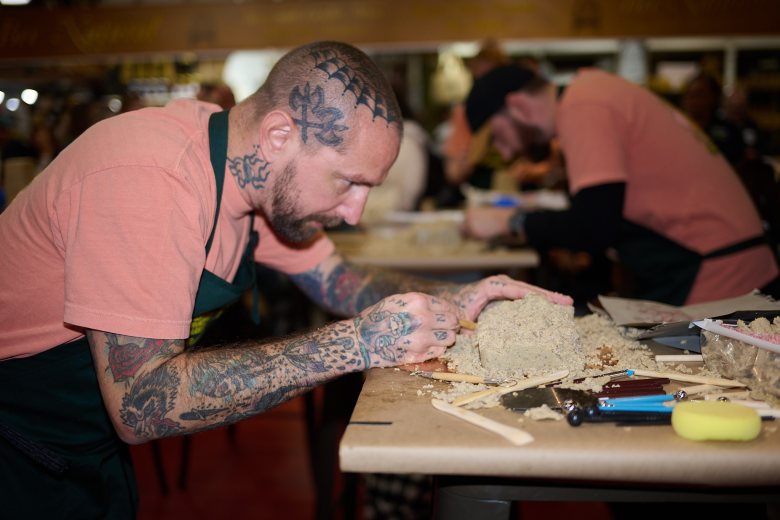 Patrick Moser, who received the trophy in the 2025 Scrapple Sculpting Contest, working on his Tush Push sculpture. (Hanbit Kwon for Billy Penn)
Patrick Moser, who received the trophy in the 2025 Scrapple Sculpting Contest, working on his Tush Push sculpture. (Hanbit Kwon for Billy Penn)
The contestants were given 100 minutes to turn the maligned meat block into grayish punchlines and greasy masterpieces.
Suda’s choice for winner of the coveted “Scrappy” trophy and a Reading Terminal Market gift card was Patrick Moser, a Delco tattoo artist whose edible masterpiece “Mush Push” commemorated the Eagles’ infamous“Tush Push” maneuver that helped propel them to a Super Bowl LIX victory.
 Strauss congratulates Patrick Moser, who received the trophy in the 2025 Scrapple Sculpting Contest. (Hanbit Kwon for Billy Penn)
Strauss congratulates Patrick Moser, who received the trophy in the 2025 Scrapple Sculpting Contest. (Hanbit Kwon for Billy Penn)
On her choice, Suda reflected that she at first “had my greatest doubts when I saw Patrick get to work because he had these very complex sketches prepared for what I imagine was the Tush Push, [but] what I realized as he was going along, was that he was working like Michaelangelo from an original block of material, carving away to the original shape of his idea, and that is very, very advanced sculpting.”
All 12 entries will be displayed during Saturday’s Scrapple & Apple Festival, giving the public a chance to choose the People’s Choice Winner for their favorite creations.
Unlike Michaelangelo’s marble creations, these melty masterpieces are much more fleeting. Once admired, these culinary creations will be set aside for composting, reminding us all of the ephemeral nature of art—and scrapple.
